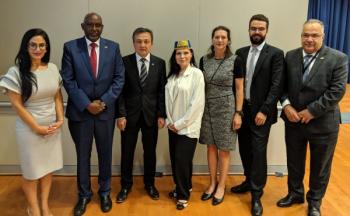EVENT: UNPO Report on Manipulation of UN Human Rights Mechanisms

Unrepresented Nations and Peoples Organization
On 17 July 2019, at the Second Stage of the US Ministerial to Advance Religious Freedom in Washington D.C, the Unrepresented Nations and Peoples Organization (UNPO) organised an event to launch the report Compromised Space, written in partnership with the University of Oxford and the Tibetan Justice Centre. The event, titled Compromised Space: How the UN is Becoming an Ever More Dangerous Place for Representatives of Religious and Other Minorities, highlighted how repressive regimes are persecuting, harassing and intimidating representatives of (religious) minorities not only at home but also when they operate at the international level, most notably at the United Nations. With testimonies from various representatives of religious and other minorities, the event illustrated the extensive scope of the problem.
After introductions by Fernando Burgés, Head of Policy & Research at UNPO, who also moderated the discussions during the event, and Mr Abdirahman Mahdi, Vice-President of the UNPO and representative of the Ogaden people, various representatives from religious and other minorities addressed the audience to speak about their individual experiences and that of their people when engaging in advocacy at home and abroad.
The first to speak was Mr Carlo Ganjeh, Representative of the Assyrian Universal Alliance. Mr. Ganjeh addressed the systematic persecution that Christian Assyrians face in their ancestral territories in the Middle East, specifically in the context of the presence and legacy of ISIS in Syria and Iraq. Moreover, it took over four years for the Assyrian Universal Alliance to be granted Special Consultative Status at the UN Economic and Social Council, only because the Turkish government systematically rejected the application. Mr. Ganjeh noted that, now that such status has been granted, Assyrians are better able to contribute to the human rights dialogue, which not only helps Assyrians but also gives a voice to other peoples who face similar issues.
Mr Dolkun Isa, President of the World Uyghur Congress (WUC) and Vice-President of the UNPO, shared a personal testimony about his troubling experiences with the United Nations. As his access to the UN buildings and events has been restricted due to Chinese demands and he and his supporters have been followed and harassed in UN buildings, Mr Isa addressed how China’s Communist Party continues to use its power as one of the major UN Member States to influence the UN’s human rights mechanisms.
Ms Samira Ghaderi, Founder and Managing Attorney at Ghaderi Law Firm and a Kurdish human rights advocate. She spoke about how Iranian Kurds lack any representation at the UN despite the fact that they constitute the largest ethnic group worldwide without a country or a state. Furthermore, Ms Ghaderi highlighted how attacks, assassinations and other extreme intimidation methods are used to silence Iranian Kurds both in Iran and abroad. Fear for such reprisals is the main reason why the violent persecution of Iranian Kurds remains underexposed at international forums such as the UN human rights mechanisms.
Ms Ayla Bakkalli, U.S. Representative for the World Congress of Crimean Tatars, addressed a similar deterioration of human rights in Russian-occupied Crimea, as the indigenous population of Crimea, the Tatars, face abuses in the form of discrimination, abductions, torture, killings and attacks on religious freedom. Ms Bakkalli explained that Crimean Tatars do not have a voice to respond to Russia’s occupation of the peninsula and subsequent human rights abuses because Russia continues to label Crimean Tatar activist groups as terrorist organisations.
Lastly, Ms Louisa Greve, Director of External Affairs at the Uyghur Human Rights Project (UHRP), reiterated the three common themes that the testimonies addressed: the extension of state repression outside the borders of state control, the (threat of) direct violence and retaliation to silent witnesses and the use of state power by repressive regimes to criminalize human rights advocates by labelling them as terrorists. She stated that this should be a concern for established democracies, even more so because it directly affects their own citizens who belong to persecuted minority groups.
Ultimately, all the eloquent testimonies given during the event point to a broader campaign of repressive regimes to manipulate the international political arena in order to escape accountability and punishment under international law for their extreme human rights violations. They also present the extensive scope of (religious) persecution and the disproportionate power individual UN member states exert in order to manipulate UN human rights mechanisms. As resonated throughout all testimonies, this needs to be addressed appropriately in order to create a safer space for representatives of religious and other minorities within UN institutions themselves.
